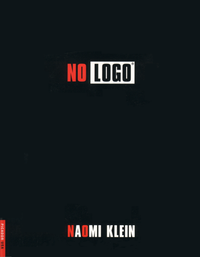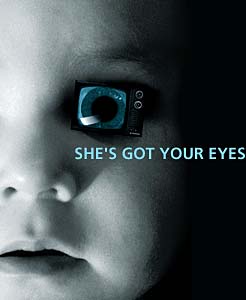
Ad Nauseum
Gary Marshall gets angry about advertising with
Naomi Klein's "No Logo"(book review excerpt)
From Spike Magazine
No Logo is a book about brands, which means it's a book about popular culture - Golden Arches, the Nike "swoosh", Tommy Hilfiger jackets and Starbucks coffee. It's about the television you watch and the newspapers you read, the theme parks you visit and the films you go to see. It's about magazines and rock music, universities and the Internet. In short, it's a book about everyday reality - or, rather, what lies behind it.
The connection between brands and corporate irresponsibility has been highlighted before - Nike's links with third world exploitation are well documented - but No Logo digs much deeper. In an attempt to describe the rise of anti-corporatism and "culture jamming", Klein covers issues as diverse as labour rights, censorship and education, and how the rise of the brands has affected them. The resulting book is likely to disturb even the most hardened of cynics.
"When deep space exploitation ramps up, it will be corporations that name everything. The IBM Stellar Sphere. The Philip Morris Galaxy. Planet Starbucks." - Fight Club
In the early chapters of the book, Klein describes the rise of the brands. Originally an importer of cheap Japanese clothing, Nike successfully reinvented itself as a "lifestyle company", selling an ideal rather than any particular physical product. As Klein reports, the most successful brands don't actually make anything - from Tommy Hilfiger to Nike, they outsource their manufacturing, and the companies themselves concentrate on the all-important brand ubiquity.
Through advertising, the companies encourage people to buy products that act as advertisements for the brand itself, turning a nation into what one executive gleefully describes as "walking billboards". Levi's repaints an entire street to promote its Silver Tab jeans, footwear companies become synonymous with sporting achievement, and beer companies co-opt music festivals to promote their products. Like the narrator in Fight Club, customers don't choose products on the basis of price or effectiveness; instead, they ask themselves "what sort of dinner set defines me as a person?"
Where No Logo surprises is when it describes the less obvious, and arguably less ethical, forms of brand promotion. According to Klein, companies such as Tommy Hilfiger use black ghettos as seedbeds for their brands, recognising the white middle-class fetish for black urban culture and employing local youths to "talk up" products to their peers. A similar technique was used by the Daewoo car company, which paid students to drive its cars and enthuse about them at every opportunity in an all too real echo of The Truman Show. If you spend any time on the Internet, you'll see entertainment companies doing the same thing on message boards and newsgroups.
Klein doesn't need to lecture you about the increasing ubiquity of sales messages - she lets the facts speak for themselves as she describes universities where Coca-Cola is "the official soft drink", schools where the mega-brands have their logos on textbooks and toilet cubicles, and university departments wholly reliant on corporate sponsorship.
"No Logo demeans the causes it purports to celebrate by offering a narrow, fashion victim's perspective on achievements that have undoubtedly helped to make the world a better place". - Barry Delaney, creative partner at Delaney Fletcher Bozell, Management Today
Where No Logo excels is in the chapters detailing the "achievements" that the above reviewer believes "have undoubtedly helped to make the world a better place". Klein presents a powerful argument that global brands have resulted in the exploitation of third world workers, increased domestic unemployment, reduced domestic wages, and the continual erosion of workers' rights. One executive responds to calls for a "living wage" by saying, apparently without irony, "while the concept is romantically appealing, it ignores the practicalities and realities of our business environment". When two McDonalds employees successfully win the right to union recognition - almost unheard of in the fast food industry - the company simply shuts down the branch.
Klein argues that McDonalds has deliberately presented itself as a company that employs teenagers while they look for their first "real" job. Despite a workforce that is considerably older and better educated than the pimply youths of repute, this successful image-making enables the company to keep hours and wages at levels which, in any other industry, would attract howls of protest. Klein also describes the conditions inside call centres, which have been described elsewhere as "the dark, satanic mills of the technological revolution". In Britain, as in America, call centres are one of the few growth industries, traditionally located in areas of high male unemployment and employing a workforce largely comprised of part-time, female - and low-paid - workers.
One of the most disturbing parts of the book is when it focuses on the issue of censorship. As the book explains, the strategies of retailers such as Wal-Mart - essentially, bulldozing the competition out of business - means that, as one record company executive admits, "Wal-Mart is the only game in town". It's something the chain hasn't been slow to realise, and the company's pro-family stance means that it regularly practices censorship. Magazine covers have to be pre-vetted by the company; if they aren't and Wal-Mart feels the cover is "inappropriate", the publication will be de-listed - in other words, the retailer will never stock that publication again. Record companies regularly tone down releases to make them appropriate for Wal-Mart's censors, and magazines know better than to feature anything less than wholesome. It's a worrying trend as, through sheer economic muscle, Wal-Mart effectively controls what the public is allowed to read, watch or listen to.
"Media concentration is high, and increasing. Furthermore, those who occupy managerial positions in the media...belong to the same privileged elites, and might be expected to share the perceptions, aspirations, and attitudes of their associates, reflecting their own class interests as well. Journalists entering the system are unlikely to make their way unless they conform to these ideological pressures" - Noam Chomsky
One key area highlighted by No Logo is the increasingly incestuous corporate world, where the same companies own television stations, record companies and newspapers. British readers will be familiar with the Sun newspaper's regular plugs for Sky TV and Fox Movies, all of whom share the same parent company, but the book describes how the links between companies can alter the news itself. An expose of theme parks by ABC was spiked after the reporters uncovered shocking events at Disney, ABC's owners, and Klein describes a number of similar occurrences in other news media.
This "corporate synergy" has an effect on politics, too. Klein recounts how journalists are expected to give certain politicians an easy ride if those politicians are responsible for handing out valuable broadcasting licences to a newspaper's parent company - a tradition that's also well-established in the UK.
Klein argues that corporate interference can also cost lives. The majority of American universities work in "partnership" with brands, carrying out research or helping develop new designs for training shoes. Klein asks whether such links devalue the traditional independence of universities - almost every sponsorship contract, explains Klein, includes a "gagging clause" that prevents any criticism of the corporate benefactor. The tale of the student expelled for wearing a Pepsi T-shirt to his college's Coca-Cola day is amusing, but Klein quickly follows this by describing how corporate-sponsored drug trials uncovered potentially fatal side effects in the sponsor's products. When the researchers attempted to publish their findings in scientific journals, the universities were threatened with the termination of their lucrative sponsorship contracts, and the researchers were promptly sacked.
On the face of it, sponsorship seems the ideal solution to the growing problem of funding for educational institutions, but many campaigners are worried about the growing presence of commercially funded learning materials in schools and colleges: as the Centre for Commercial-Free Schools notes, "when [the] Consumers Union collected and evaluated examples of these materials, it found that 80 percent contained biased or incomplete information, and promoted a viewpoint that favoured consumption of the sponsor's product or service or otherwise favoured the company and its economic agenda". In an article aimed at schoolchildren, activist magazine Adbusters argues that "companies profit by changing the way you think. Representatives of the drug Prozac will come to your school to 'teach' you about depression. Exxon has [an] ecology curriculum that shows how clean the environment of Alaska is".
"Let's remember November 30 and the days that followed as the launch of the Seattle Rebellion, the anti-corporate resistance that will reshape society in the next 10 years. It wasn't a skirmish or an opening salvo, but a manifesto etched in the streets by tens of thousands of people." - Adbusters
The closing chapters of No Logo investigate the growing number of protests against globalisation, of which the Seattle Riots of late 1999 and the current anti-GM food campaigns have been the most visible. Although both events occurred after the book's completion, they help to reinforce Klein's conclusion that the rise of global brands and increasing consumer awareness is leading to a growing backlash.

One of the most visible forms of anti-corporatism is "culture jamming", espoused by groups such as Adbusters and the band Negativland. Culture jamming attempts to subvert the ubiquitous advertising messages by spoofing them or altering their meaning in Situationist-style pranks, and the Adbusters site in particular offers a "culture jammer's toolkit" together with a gallery of spoof adverts (we've used some of them to illustrate this article).
Klein rightly questions the effectiveness of these tactics. While the proponents talk of their activities with missionary zeal, the corporations are hardly changing their policies as the result of a few spoof adverts. As Klein points out, culture jamming has been co-opted by the very advertisers it aims to subvert - see the recent "image is nothing. Thirst is everything" campaign by Sprite, or MTV's continual adoption of "underground" imagery to reinforce its own brand identity. Even anti-corporatism has become a marketable commodity, as the success of major studio picture Fight Club demonstrates.
Klein is more enamoured with activists such as the defendants in the McLibel trial, who successfully raised awareness of many of McDonalds' activities, and the semi-political "reclaim the streets" movement. Rather than the outlandish hippies the media portrays them to be, Klein discovers that the people involved in the movement are attempting to make people think about the way in which every available part of civic space is saturated with advertising.
It's in this section of the book that No Logo falters. While Klein clearly believes that Reclaim The Streets is one of a number of groups that will define the politics of the future, the fact that most of the population believe the group's members are all drug-crazed anti-car crusties shows the difficulties inherent in swimming against the tide of globalisation and media concentration. The book rightly highlights the role of the Internet in helping activists to organise and disseminate information, and the outcry over genetically modified foods demonstrates the effect that a well-organised, single-issue campaign can have. By comparison, the demonstrations against the World Trade Organisation in Seattle seemed to have no clear agenda and, by degenerating into riots, made it easy for the media to dismiss any legitimate protest as the work of subversives and "terrorists". As Klein points out, Adbusters magazine is starting to resemble the very media companies it urges its readers to fight against, while she cheerfully admits the irony of massive global corporations publishing anti-corporate polemics such as No Logo, which are marketed just like any other product.
No Logo is a powerful read - Chomsky without the paranoia - and, if you have even the slightest interest in popular culture, it's an essential one. Unfortunately, while it's easy to share Klein's concerns, it's much harder to share her optimism about the future.
0 Comments:
Post a Comment
<< Home